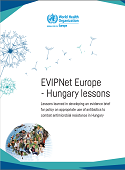EVIPNet Europe - Hungary lessons. Lessons learned in developing an evidence brief for policy on appropriate use of antibiotics to combat antimicrobial resistance in Hungary (2019)

Download
Hungary, which has been an EVIPNet member since 2015 (as part of the Biennial Collaborative Agreement between WHO Europe and Hungary), undertook the development of an EBP in 2016. The team responsible for the EBP was led by a national EVIPNet champion and included experts from Hungary’s National Healthcare Services Center, the Ministry of Human Capacities, the University of Szeged, and the Jahn Ferenc Dél-pesti Hospital and Polyclinic in Budapest, supported by the WHO Country Office. Based on the available evidence, the Hungarian Ministry of Human Capacities selected antimicrobial resistance (AMR) as a priority topic from a list of topics that the EVIPNet team had identified during a situation analysis. AMR increases the burden of hospital-acquired infections, leads to longer hospital stays, and can have other serious and wide-reaching complications, such as higher mortality rates. The EVIPNet team decided to focus on the specific problem of inappropriate use of antibiotics because this had received very little policy attention previously and addressing it could have the greatest impact at country level.
Creating an EBP is a complex process that necessitates gathering a team of experts to analyse and synthesize a wide variety of knowledge sources. This process can be divided into a number of specific stages. These stages, as they relate to the Hungarian experience with an EBP on AMR, are outlined below. Importantly, before this process began, the Hungarian EBP team participated in an extensive EBP training programme, provided by the WHO Secretariat for EVIPNet Europe and its expert collaborators. This included a series of webinars and a face-to-face training session. Throughout the EBP development process the team continued to receive support from the WHO Secretariat and the WHO European Region AMR programme, in collaboration with the WHO Country Office and expert collaborators, which included technical assistance and reviews of the EBP.



